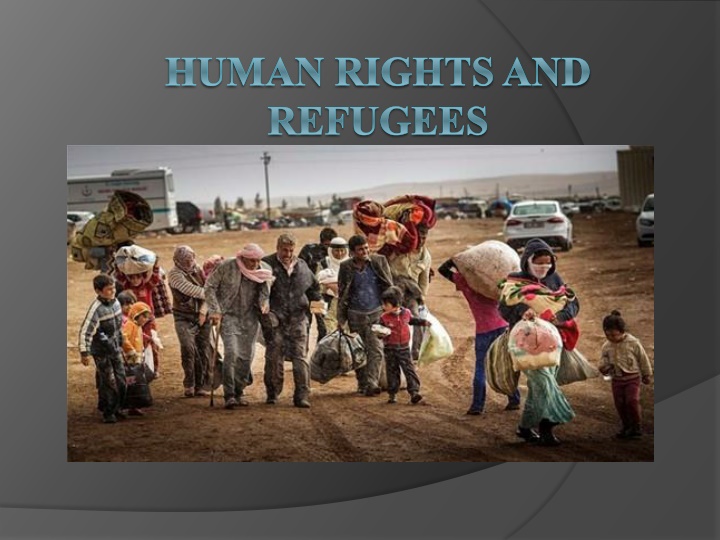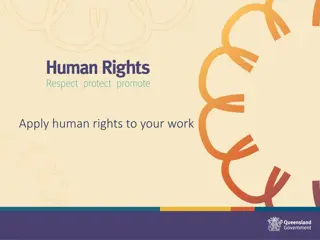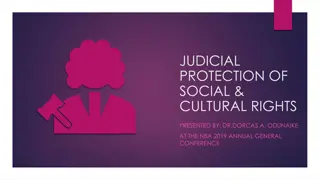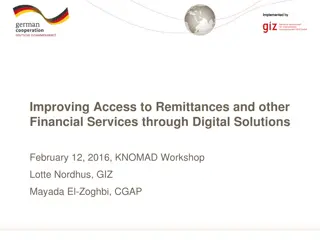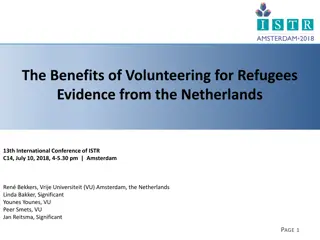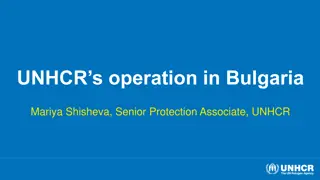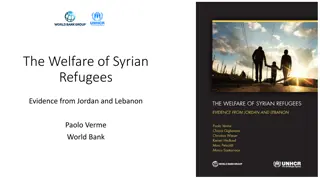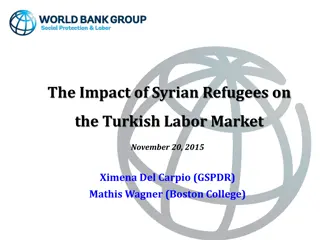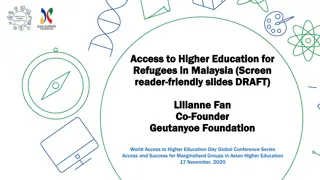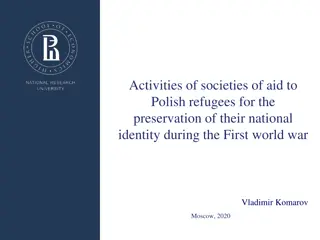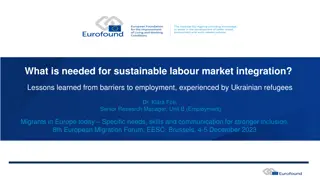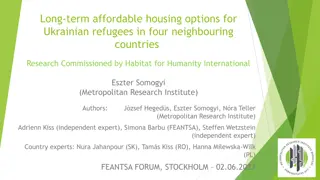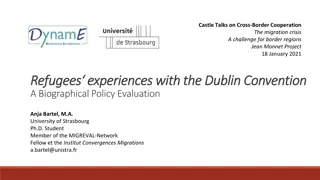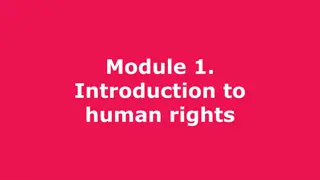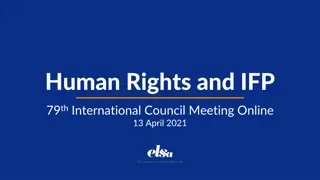Human Rights and Refugees: International Protection and Rights
The loss of one's native land, the global acknowledgement of the refugee problem, and provisions related to refugees under the Universal Declaration of Human Rights and International Covenant on Civil and Political Rights are explored. Direct protective measures for refugees, the features of the 1951 Convention, and the rights of refugees are highlighted, emphasizing the importance of upholding human rights and providing asylum to those in need.
Download Presentation

Please find below an Image/Link to download the presentation.
The content on the website is provided AS IS for your information and personal use only. It may not be sold, licensed, or shared on other websites without obtaining consent from the author.If you encounter any issues during the download, it is possible that the publisher has removed the file from their server.
You are allowed to download the files provided on this website for personal or commercial use, subject to the condition that they are used lawfully. All files are the property of their respective owners.
The content on the website is provided AS IS for your information and personal use only. It may not be sold, licensed, or shared on other websites without obtaining consent from the author.
E N D
Presentation Transcript
HUMAN RIGHTS AND REFUGEES
Dr. P.RAMAR, M.A.,(Hist.),M.A.,(HR),M.Ed.,M.Phil.,Ph.D Associate Professor of History, D.G.Govt.Arts College for Women Mayiladuthurai 609 001 Email id:drramar_auhis@yahoo.in Mobile: 9442424244 2
There is no greater sorrow on earth than the loss of ones native land -Euripides 3
The refugee problem was acknowledged as having international dimensions and global co operation as far back as 1921-22 Real movement to protect refugees began only with the 1948 Universal Declaration of Human Rights. It proclaimed basic rights for all human beings irrespective of their nationality or citizenship. 4
PROVISIONS RELATED TO REFUGEES UNDER UDHR Article 3 provides that everyone has the right to life, liberty and security of person. Article 14 declares that Everyone has the right to seek and enjoy in other countries asylum from protection. This right may not be invoked in the case of prosecutions genuinely arising from non-political crimes or from acts contrary to the purposes and principles of the United Nations. 5
PROVISION RELATED TO REFUGEE UNDER INTERNATIONAL COVENANT ON CIVIL AND POLITICAL RIGHTS Article 6 states that Every human being has the inherent right to life. The right shall be protected by law. No one shall be arbitrarily deprived of his life. 6
DIRECT PROTECTIVE MEASURES FOR REFUGEES The UN s 1951 Convention relating to the status of refugees 1967 protocol relating to the status of refugees The above to documents have been considered as International Refugee Protection Magnacarta of 7
FEATURES OF 1951 CONVENTION It consists of 1 preamble and 46 articles related refugees and their rights. Article 1 defines the term refugee for the purpose of the convention 8
a refugee is a person, who has fled his/her country owing to well-founded fear of being persecuted for reasons of race, religion, nationality, membership of a particular social group or political opinion, is outside the country of his/her nationality, and is unable or, owing to such fear, is unwilling to avail himself of the protection of that country; or who, not having a nationality and being outside the country of his former habitual residence as a result of such events, is unable or owing to such fear, is unwilling to return to it 9
Article 2-11-general provisions Article 12-16- pertain to the juridical status of the refugees Articles 17-19 concern the rights of refugees to engage in gainful employment Articles 20-24- concern the welfare of the refugee in regard to such matters as rationing, housing, public education ,public relief , labour legislation and social security 10
Article 25 deals with the provision of administrative assistance to refugees Article 26 deals with their freedom of movement Articles 27 and 28 deal respectively with the issue of identity papers and of travel documents to enable them to travel outside their country of lawful residence 11
Article 29 deals with the applicability of fiscal charges to refugees Article 30 deals with the right of refugees to transfer their assets from the territory of a Contracting State to another country where they have been admitted for resettlement Article 31 and 33 contain important provisions which are relevant to the question of asylum. 12
Article 34 of the Convention requires contracting States as far as possible to facilitate the assimilation and naturalization of refugees and in particular to make every effort to expedite naturalization proceeding and to reduce the charges and costs of such proceedings. Articles 35 to 46 of the Convention requires the contracting States to co operate with the office of the United Nations High commissioner for Refugees in the exercise of function and in particular to facilitate its duty of supervising the applications of the provisions of the Convention 13
1967 PROTOCOL RELATING TO THE STATUS OF REFUGEES Outlines a refugee s rights including Freedom of religion and movement Freedom from being penalized for illegal entry and being deported unless certain conditions are met Right to work, accessibility to travel documents, it also underscores obligations to host government education and a refugee's 14
UNDER THE CONVENTION AND PROTOCOL Refugee status is based on five grounds A well-founded fear of persecution that is threat to life or liberty because of Race Religion Nationality Membership of a particular social group Political opinion 15
REFUGEES RIGHTS UNDER 1951 CONVENTION AND 1967 PROTOCOL The right not to be returned to country where they are likely to face persecution the right not to be expelled, except under certain strictly defined conditions Exemption from penalties for illegal entry into the territory of a contracting state Freedom of religion and free access to courts Freedom of movement 16
The right to identify papers and travel papers and travel documents The right to public education 17
CESSATION OF REFUGEES He or she voluntarily re-availed himself or herself of the protection of the country of his or her nationality Having lost his or her nationality, he or she has voluntarily re-acquired it. He or she has acquired a new nationality He or she has voluntarily re-established himself or herself in the country which he or she left 18
The circumstances in connection with which he or she has been recognised as a refugee have ceased to exist, and he or she can no longer continue to refuse the protection of the country of his or her nationality He or she without nationality, but because of a change of circumstances in connection with which he or she has been recognised as a refugee have ceased to exist, is able to return to his or her country of former habitual residence 19
EXCLUSION People who have a committed crime against peace, a war crime or crime against humanity, or a serious non-political crime outside the country of refugee prior to admission to that country as refugees They have been guilty of acts contrary to the purposes and principles of the United Nations The persons already receiving protection or assistance from agencies of the UN, other than UNHCR 20
Persons who are not considered to be in need of international protection because they are in a country where they have been granted most of the rights normally enjoyed by nationals, short of formal citizenship 21
REGIONAL CONVENTIONS Convention Governing the specific Aspects of Refugees Problems in Africa-1969 It expanded the 1951 definitions of a refugee to include every person who, owing to external aggression, occupation, foreign domination or events seriously disturbing public order in either part or the whole of his country of origin or nationality, is compelled to leave his place of habitual residence in order to seek refuge in another place outside his country of origin or nationality 22
LATIN AMERICA-CARTAGENA DECLARATION (1984) Among refugees persons who have fled their country because their lives, safety or freedom have been threatened by generalizes violence, aggression, internal conflicts, massive violation of human rights or other circumstances which have seriously disturbed public order. foreign 23
ASIA BANGKOK PRINCIPLES- 1966 (REVISED IN 2001) Persons who have a well founded fear of persecution due to color, ethnic origin and gender. 24
UNHCR- THE UN REFUGEE AGENCY 1921-Council of the League of Nations appointed Dr.Fridtjof commissioner on behalf of the League in connection with the problems of Russian refugees in Europe 1931,the League created the International Nansen Office for Refugees 1943- United Nations Rehabilitation Administration established 1947-the UN created the International Refugee Organization Nansen High Relief and was 25
UNHCR was created by Resolution 428(y) of the General Assembly of the United Nations Began its operations on 1 January 1951 It is a subsidiary organ of the General Assembly, under Article 22 of the UN Charter Headquarters in Geneva UNRWA-United Nations Relief and Work Agency-established to assists and provide relief to Palestinian refugees within a defined geographic area 27
UNHCR ASSISTANCES 5 types of assistances Emergency Assistance- which includes measures to meet basic needs, usually in case of a new refugee influx. The assistance does not normally exceed a period of twelve months Care and maintenance- which covers assistance once survival is no longer threatened. It involves meeting basic needs on a more routine basic, pending the identification of durable solutions 28
Voluntary repatriation which covers preparations for departure to the country of origin, transportation etc. in most cases, it involves activities in the country of origin ,including organizing reception facilities and assistance during the initial phase of reintegration Local settlement assistance- which may be provided to refugees who cannot return home. It alms to promote their self- sufficiency and local integration 29
Resettlement-which may be offered to refugees who are admitted temporarily to a country of asylum, who cannot return to their home country and who face particular protection problems. 30
WORLD REFUGEE DAY On 4 December 2000, the United Nations General Assembly in Resolution 55/76 decided that, from 2001, 20 June would be celebrated as World Refugee Day. In this resolution, the General Assembly noted that 2001 marked the 50th anniversary of the 1951 Convention relating to the Status of Refugees.African Refugee Day had been formally celebrated in several countries prior to 2000. The UN noted that the Organization of African Unity (OAU) had agreed to have International Refugee Day coincide with Africa Refugee Day on 20 June 31
CONCLUSION Refugees: A continuing Challenge for Humanity 32
World Refugee Day June 20- 2012 Today marks World Refugee Day, which the United Nations awareness of the plight of the estimated 42 million displaced people worldwide. A UN report released this week showed that 800,000 people were forced to flee across borders last year -- more than any time since 2000. In a message to mark the day, UN Secretary General Ban Ki-moon said, "Refugees leave because they have no choice. We must choose to help." uses to raise 33
Be human Thank you 34
